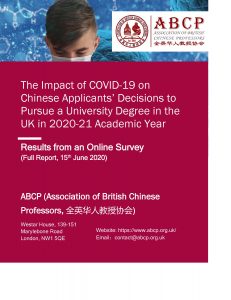Date: 15th June, 2020 (updated on 28th June, 2020)
From 12th May to 7th June 2020, the ABCP conducted an online survey on current and prospective Chinese applicants’ intention to pursue tertiary education in the UK in the 2020-21 academic year. The survey comprises five parts: the impact of COVID-19 on applicants’ decision to study in the UK; attitudes towards online learning option; support required during the application process; general motivation and expectation of study in the UK; and some basic demographic information including age, gender, degree programme studied, study subject, and status of their application or intention to apply. We also made the survey open to parents so some responses were from parents rather than applicants themselves.
In total we received 10,107 responses, and after a manual screening process 9,648 responses (95.5%) were considered valid. A detailed data analysis using multiple methods was conducted including some statistical tests to help understand significant differences of responses from different subgroups of respondents. The detailed results can be found in the main body of the report. Below we list selected key findings from the survey and some selected recommendations we give to UK universities. An earlier version of the full report has been made available to the UK HEIs (higher education institutions) and other relevant organisations for free on 15th June. On 28th June, the Association released a re-edited version for the general public to access for free.
Selected Key Findings
- About three in four of the respondents reported that COVID-19 had affected their plan to study in the UK. Respondents planning to study a postgraduate taught (PGT) degree programme were more likely to report such impact than their undergraduate (UG) peers.
- More than half of all respondents preferred postponing their study start until January 2021 to have a complete on-campus learning experience, but over one in three respondents were also happy to go for two other options: starting in September 2020 as usual with or without online teaching elements.
- With online learning, more than half of all respondents were concerned about the access to digital learning resources, and about three in four were concerned about their ability to manage online learning and to understand online content. Almost six in seven respondents considered it is important to have weekly video-based individual or small group sessions with the lecturer.
- The two most important types of information and support during the application process include a clear admission guide and a clear application process, each agreed by more than half of all respondents.
- The top four listed motivations for Chinese applicants to study in the UK universities (each agreed by almost or more than half of all respondents) are:
- to improve their career prospects (around two in three respondents),
- to gain a more internationally recognised degree (more than five in nine respondents),
- to broaden their life experience (around five in nine respondents), and
- to have a better study environment (nearly half of all respondents).
- The top three listed important aspects for Chinese students to study in the UK are:
- to have a local work placement opportunity (over half of all respondents),
- personal health and safety (close to four in nine respondents),
- friendship with UK students (close to four in nine respondents).
Selected Recommendations to UK HEIs
- Offering a more flexible arrangement of blended teaching for 2020-21 academic year to accommodate needs of different subgroups of prospective applicants.
- Allowing multiple arrival dates of new students in 2020-21 academic year, particularly allowing late arrivals in January 2021.
- Enhancing engagement with offer holders, current applicants and all students to reduce their concerns on discrimination and hate speech against Chinese people.
- Enhancing communications with offer holders, current applicants and all students to keep them better informed about the NHS system in the UK and local medical and health care support students have access to.
- Providing more support to students on online learning, especially offering small-group video-based sessions to students when lectures are delivered via online teaching and providing more effective e-learning support.
- Introducing more local placement opportunities and extended research projects to students, especially to those who will arrive in the UK late in January 2021 for studying a PGT degree programme so that they can still have a complete experience of staying in the UK for a whole year.
- Considering conducting own surveys with offer holders, current applicants and students from China and other foreign countries to get a better local understanding of how the COVID-19 pandemic has affected their study plans and their main concerns and wishes.
Acknowledgements
The Association thanks all people and organisations who helped in different stages of the project, from its planning, questionnaire design, promotion, external liaison, to the final data analysis and reporting compilation. We also would like to thank all participants of the survey for taking the survey and providing their views on how the COVID-19 had affected their or their children’s study plan in the UK.

